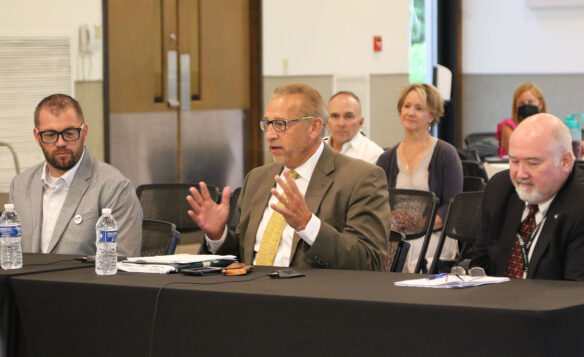
Kentucky Department of Education Associate Commissioner David Couch, center, discusses the Kentucky Education Technology System (KETS) operational plan for the upcoming school year at the Kentucky Board of Education meeting at Lake Cumberland on Aug. 3, 2022. He was joined by the department’s Chief Digital Officer, Marty Park, left, and Division Director Mike Leadingham, right. Photo by Jacqueline Thompson, Aug. 3, 2022
The Kentucky Board of Education held several discussions around online, virtual and remote learning during its regular meeting on Aug. 3, held at Lake Cumberland.
Kentucky Department of Education (KDE) Associate Commissioner David Couch, Chief Digital Officer Marty Park and Division Director Mike Leadingham discussed the Kentucky Education Technology System (KETS) operational plan for the 2022-2023 school year.
Couch told the board about $502 million in federal, state and local district funds that will be available this coming school year to address the education technology-enabled products and services for all 171 school districts and state schools (the Kentucky School for the Blind, Kentucky School for the Deaf and Area Technology Centers). This is the most that has ever been made available in the 30-year history of KETS.
KBE approved $15.4 million in funding for the KETS operational plan for the upcoming school year to provide basic technology-enabled services, expand technology, replace aging devices, enhance cybersecurity and recruit and retain the technology workforce that is needed.
“This is the most money we’ve ever had available for education technology going into the next school year,” said Couch.
Couch provided a handout showing students without access to technology in school and at home are less likely to gain 21st century learning skills. Kentucky schools are combatting this issue by providing students with more digital access.
Strong online skills, such as using shared digital workspaces, have been correlated with increased collaboration in the classroom, Couch’s handout showed. Students who have access to computers and the internet are more likely to use technology more frequently and have better technology skills.
Couch said Kentucky was “decades ahead” of other states when it came to connecting schools to the internet.
Currently, 100% of Kentucky schools provide Wi-Fi access to students. Of these, 99% of schools have implemented dense Wi-Fi networks capable of supporting a Bring Your Own Device (BYOD) initiative, which encourages students to use their personal devices in the classroom, or a 1 to 1 initiative, in which a school district provides a device for every student.
Couch also encouraged the board to continue to support future funding opportunities for education technology in order to avoid a drop off in access to this technology within Kentucky school districts.
“During your time as board members … the things we have done in Kentucky history, in national history, are pretty amazing,” he said.
Couch and Park later joined KDE Associate Commissioner Robin Kinney, Deputy Commissioner and Chief Equity Officer Thomas Woods-Tucker, and Chief Academic Officer Micki Ray to discuss the proposed regulation 704 KAR 3:535, which would create an option for full-time enrollment in online, virtual and remote learning programs for K-12 students.
The regulation requires the student’s guardian to request to participate in the program if a program is offered by the district. All districts have the option whether to offer a program. This option previously was offered only to grades 5 through 12 and the proposed regulation extends it to kindergarten through grade 4.
“I always say … [decide] what is your best education plan first, then lay technology on top of it,” said Couch.
Couch said there were some students during the COVID-19 pandemic who thrived in a remote and virtual setting. Going forward, he sees this continuing for approximately 1-2% of students.
“It’s not a huge percentage [of students], but it’s a pathway to the finish line for those students,” he said.
The proposed regulation creates a new definition for a full-time enrolled online, virtual and remote learning program: a public school district program that enrolls K-12 students on a full-time basis where teachers and students are not in the same physical location, and all or most of the instruction is provided online through a combination of synchronous and asynchronous strategies.
The proposed regulation also states that a full-time enrolled program shall not be classified as an alternative education program, and the placement of students in the program is voluntary.
The board approved the regulation and it will take 7-9 months to go into effect.
KBE Work Session
On Aug. 2, the day before the meeting, the board gathered for a work session to discuss how to reach its goals and prepare for the upcoming year.
KDE Chief Communications Officer Toni Konz Tatman helped the board become better prepared to communicate the United We Learn vision for the future of education in the Commonwealth to stakeholders. She closed her presentation by encouraging the board members to “always remember why you are doing this work.”
Board members also heard from KDE’s Director of Diversity, Equity, Inclusion and Belonging, Damien Sweeney, and Ray and Park on how virtual learning programs can address themes critical to social-emotional health and academic success.
Sweeney said virtual learning programs can provide “voice and choice” to students by creating a learning experience that is unique to a student’s needs.
Park introduced several special guests to the board from the Bullitt Virtual Learning Academy (BVLA) (Bullitt County), including BVLA Principal Danny Clemens, Instructional Coach Dominic McCamish and Bullitt County Assistant Superintendent Adrienne Usher. BVLA is a recently developed virtual school where students can decide where they would like to participate in remote learning.
Clemens said BVLA students are not isolated when they enroll in the virtual program. Students can participate in virtual field trips and in-person extracurricular activities like marching band, sports, academic team and prom.
BVLA students become college or career ready, and the flexibility of the virtual setting allows students to attend classes while simultaneously earning an associate degree.
Clemens said the virtual program is great for students in all situations, including those with medical needs, anxiety and other mental health needs, accelerated learners, and those who might struggle with learning in a traditional classroom.
In other business, the board:
- Addressed the catastrophic flooding in eastern Kentucky. KBE Chair Lu S. Young said KDE held the first virtual Superintendents Huddle for Flood-Impacted Districts so the agency can begin to establish how it can best support the immediate, short-term and long-term needs of districts. School districts in the region are assessing damages to buildings and facilities, community infrastructure, restoration and cleaning requirements in affected buildings, and the community’s recovery status in general. As the immediate needs of food, shelter and clothing are identified and met, and power and water services are restored, districts will begin to plan their return to school;
- Presented the 2022 Grissom Award for Innovation in Special Education to special education teacher Barbara Washington and instructional partners Alexis Patterson and Jeanine Mosher;
- Heard a reflection from Willie Edward Taylor Carver Jr. on his term as 2022 Kentucky Teacher of the Year;
- Approved an amendment of 702 KAR 7:125, pupil attendance;
- Re-elected Young as board chair and Sharon Porter Robinson as vice chair;
- Approved the recipient of the 2022 Kelly Award for Business and Education Partnership. The award will be presented at the board’s October regular meeting;
- Appointed KBE members Steve Trimble, Lee Todd and Holly Bloodworth to serve on the State Evaluation Appeals Panel for the 2022-2023 fiscal year;
- Renewed the board’s membership to the National Association of State Boards of Education;
- Heard an update from Bloodworth on the recommendation for the state-level portrait of a learner/graduate;
- Heard from KDE Associate Commissioners Beth Hargis and Gretta Hylton about how the KBE can support the Kentucky School for the Blind (KSB) and Kentucky School for the Deaf (KSD);
- Approved a request to permit the Pulaski County School District to purchase property for which the acquisition and site preparation costs exceed 10% of the project budget;
- Heard a report from the president of the Council on Postsecondary Education, Aaron Thompson;
- Heard a report from Education Commissioner Jason E. Glass;
- Heard an update from KDE Chief Performance Officer Karen Dodd on KDE’s strategic planning process; and
- Approved consent agenda items:
- Annual amendments to the Kentucky Tech Policies and Procedures;
- Amendments to 705 KAR 4:041, work-based learning program standards;
- Certification of 702 KAR 1:170, school district data security and data breaches, to avoid expiration;
- Annual policy adoptions and amendments for the KSB and the KSD;
- Hearing officer’s report; and
Litigation report.




Leave A Comment